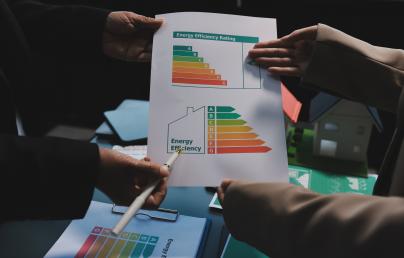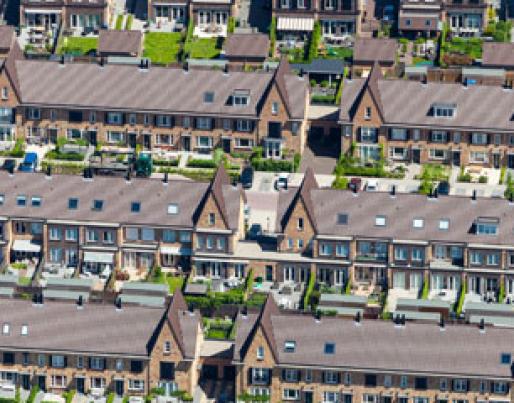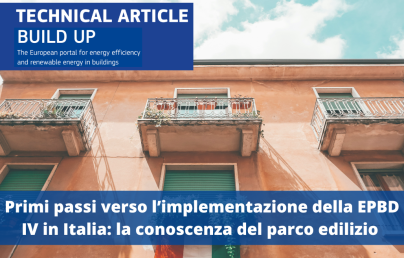
Can municipalities boost condominium renovations?

Can municipalities boost condominium renovations?
CondoReno examines effective ways for municipalities among other stakeholders to support energy renovations in condominiums. The roles, challenges, and potential of seven municipalities in the Netherlands and Flanders were analysed to explore how they can optimise business models for greater engagement in the early phases of energy renovations.
The revised Energy Performance of Buildings Directive (EPBD), enacted in April 2024, introduces transformative measures to accelerate the decarbonisation of the EU’s building sector. Central to these updates are Minimum Energy Performance Standards, mandating renovations of the most energy-inefficient buildings to enhance energy efficiency and cut greenhouse gas emissions. Article 18 of the directive emphasises establishing technical assistance facilities, such as one-stop shops (OSS), to provide comprehensive support to stakeholders involved in building renovations. These facilities are designed to offer streamlined information and assistance, focusing on households facing energy poverty and the poorest-performing buildings.
While substantial European Union (EU) funding supports municipalities in implementing the EU and EPBD’s ambitious goals, critical questions arise: How do municipalities address EU strategies and the EPBD goals to boost energy renovations within their cities, particularly for homeowners’ associations? What approaches are they adopting to meet these objectives? These questions are particularly relevant as municipalities often play a key role in guiding the early phases of energy renovations [1]. Understanding their potential, limitations, and the strategies needed to optimise their involvement is crucial for achieving the EPBD’s 2050 outlook. The LIFE project CondoReno examined the current role of 7 medium and big-sized municipalities, focusing on their ability to support and drive energy renovations in homeowners’ associations (HOAs).
The decarbonisation of the building sector is a pivotal goal of the EU’s 2050 climate agenda, with municipalities playing an increasingly central role in this transition. A study that was published in a technical report by CondoReno titled 'Activating business models for condominium renovations' [2] and a journal article titled 'Integrated home renovation services as a means to boost energy renovations for homeowner associations: A comparative analysis of service providers’ business models' [4] have analysed the business models of seven municipalities in the Netherlands and Flanders, using the Business Model Theory to examine how these local governments create, capture, and deliver value to their inhabitants. The publications shed light on the challenges and opportunities municipalities face in supporting energy renovations, particularly for HOAs.
Municipalities as trusted institutions
Municipalities are uniquely positioned as trusted public institutions, making them well-suited to support their local communities in achieving the EU’s ambitious energy goals. They are often tasked with facilitating energy renovations due to their established connection with local residents and their role in addressing broad societal challenges like energy poverty. Substantial funding from EU initiatives and national programs enables municipalities to initiate impactful measures, but their capacity to act effectively varies widely.
Services and initiatives by municipalities
Some of the seven municipalities have taken proactive steps to boost energy renovations for HOAs in their cities, including hiring or training staff to become experts in energy efficiency and renovation processes. These professionals, often referred to as energy coaches or advisors, provide tailored guidance to residents and HOAs. Some municipalities have also established energy houses, booths, or advisory offices where residents can access free advice.
Municipalities frequently organise free events to promote energy transitions, raising awareness about available resources, grants, and strategies for improving building energy performance. They often engage directly with HOAs by supporting and even steering board meetings to address specific renovation challenges. This hands-on involvement has proven crucial in guiding HOAs through the often complex decision-making processes involved in energy renovations.
Weaknesses and threats in municipal engagement
While municipalities are making strides, several challenges hinder their ability to provide consistent and comprehensive support. A key issue is the lack of long-term financial sustainability. As public institutions, municipalities typically do not generate revenue from their services. This reliance on funding makes them vulnerable to shifts in policies or regulations, which could jeopardise their ability to maintain current service levels.
Additionally, resource allocation remains a significant challenge. Municipalities must balance their broad societal responsibilities, such as addressing energy poverty and promoting sustainability, with the practical demands of providing targeted services to individual HOAs. Some municipalities struggle to recruit or retain skilled professionals to act as energy advisors, leading to inconsistencies in the quality and availability of services.
Municipalities’ dependence on external funding is a structural weakness. When policies or funding streams change, their ability to maintain services diminishes, leading to disruptions in support for HOAs. This financial instability often limits their ability to hire and retain skilled professionals, such as energy advisors, resulting in inconsistent service delivery across regions.
The need for accountability and performance metrics
One major gap in the current municipal business model is the lack of accountability and performance metrics. Municipalities often operate without clear benchmarks for success, making it difficult to assess the impact of their initiatives. Introducing standardised performance indicators, such as the number of HOAs supported, renovation projects completed, or energy savings achieved, would help municipalities evaluate their effectiveness and refine their approaches.
Strengths of municipal involvement
Despite these challenges, municipalities have several notable strengths. They excel at addressing broad societal issues, such as energy poverty, in an inclusive and community-oriented manner. Their ability to tailor advice to the diverse needs of their residents fosters trust and enhances community engagement. By integrating community welfare into their energy renovation initiatives, municipalities ensure that these efforts benefit a broad spectrum of residents, including vulnerable groups.
Discussion
The research recommends exploring the following opportunities:
Early-stage involvement
The analysis reveals that municipalities are predominantly involved in the early stages of the renovation journey for HOAs (Figure 1). This stage is critical, as it sets the foundation for the success of energy renovation projects. Municipalities’ support during this phase often includes providing initial advice, guiding HOAs through funding applications, and connecting them with technical experts or service providers (if applicable).
By focusing on the early stages, municipalities help HOAs overcome common barriers, such as lack of knowledge, coordination challenges, and financial uncertainty [3]. Their involvement is instrumental in ensuring that HOAs are equipped with the information and resources needed to make informed decisions and take the first steps toward energy renovation.
Figure 1: Municipality involvement within the energy renovation journey for HOAs. (Source: modified from Elgendy et al. 2024)
Optimising municipal business models: addressing limitations and enhancing collaboration
Business model innovation can also be for public sectors [6]. Business models serve as a strategic framework for analysing and understanding how an organisation creates, delivers, and captures value [5]. While municipalities are central to supporting energy renovations, the analysis highlights significant inefficiencies and limitations in their current business models. Their reliance on public funding and lack of financial self-sustainability make them highly vulnerable to policy and regulatory shifts. Additionally, their role often extends beyond their institutional mandate, pushing them into responsibilities they may not have the capacity or expertise to manage effectively.
Collaboration: a pathway to sustainability and impact
Municipalities can shift from acting as sole service providers to becoming facilitators of multi-stakeholder collaborations. Energy renovations require a coordinated effort involving diverse actors, including private companies, non-profits, financial institutions, and HOAs themselves. By leveraging the expertise and resources of these stakeholders, municipalities can focus on their core strengths—building trust, setting policy frameworks, and ensuring inclusivity—while delegating technical and operational tasks to specialised partners.
For instance, municipalities could formalise partnerships with OSS, which are designed to provide comprehensive renovation services. OSS[FS2] can oversee technical assessments, financing solutions, and project management. Similarly, collaborations with financial institutions could streamline access to innovative financing options, such as energy performance contracts or green loans, reducing the administrative burden on municipalities and local experts and companies involved in a renovation journey.
Policy and regulatory reforms to support collaboration
National and EU policies must evolve to encourage and incentivise these collaborations. Current frameworks often place municipalities at the centre of energy renovation efforts without providing adequate long-term structural support for partnerships. Policymakers should create clear guidelines and funding mechanisms that enable municipalities to formalize collaborations with other stakeholders.
Additionally, regulatory frameworks should encourage private sector participation in energy renovations while safeguarding public interests. This could involve setting standards for private actors, such as energy service companies (ESCOs), to ensure accountability and quality, encourage greater private sector involvement in energy renovations and provide support for SMEs through measures such as tax exemptions or other targeted incentives. Municipalities, in turn, could focus on monitoring and evaluation roles, ensuring that these collaborations align with broader societal goals.
Rethinking municipal roles in the renovation journey
Municipalities could adopt a more strategic role, concentrating on enabling the conditions for success rather than micromanaging the renovation process. For example, they could focus on:
Capacity building: Providing training and resources to HOAs and local professionals to empower them to take charge of renovation projects.
Facilitating networks: Connecting HOAs with qualified service providers, financiers, and OSSs.
Advocacy: Using their political leverage to secure sustained funding and favourable policies for energy renovations.
Conclusion
Municipalities have a crucial role to play in driving energy renovations, but their current business models are neither sustainable nor optimised for long-term impact. To address these issues, municipalities could embrace collaboration, focusing on their strengths while leveraging the expertise of private and non-profit actors.
Policy reforms could enable municipalities to formalise partnerships, adopt strategic roles, and ensure accountability. Only by transforming their business models and working within a broader ecosystem of stakeholders can municipalities effectively contribute to the EU’s 2050 climate goals. This shift is not just desirable but essential for achieving scalable, sustainable energy renovations across Europe.
References
[1] Economidou, M., Della Valle, N., Melica, G., & Bertoldi, P. (2024). The role of European municipalities and regions in financing energy upgrades in buildings. Environmental Economics and Policy Studies, 26(2), 369–401. https://doi.org/10.1007/s10018-023-00363-3
[2] Elgendy, R., & Mlecnik, E. (2024). Activating business models for condominium renovations: Identification of viable business models for Integrated Home Renovation Services for condominiums in the Netherlands and Flanders (D2.2). https://research.tudelft.nl/en/publications/activating-business-models-for-condominium-renovations-identifica
[3] Elgendy, R., Mlecnik, E., Visscher, H., & Qian, Q. (2024a). Barriers and solutions for homeowners’ associations undertaking deep energy renovations of condominiums: ECEEE 2024 Summer Study on Energy Efficiency. Proceedings of the ECEEE 2024 Summer Study on Energy Efficiency, 541–554. https://research.tudelft.nl/en/publications/barriers-and-solutions-for-homeowners-associations-undertaking-de
[4] Elgendy, R., Mlecnik, E., Visscher, H., & Qian, Q. (2024b). Integrated home renovation services as a means to boost energy renovations for homeowner associations: A comparative analysis of service providers’ business models. Energy and Buildings, 320, 114589. https://doi.org/10.1016/j.enbuild.2024.114589
[5] Osterwalder, A., Pigneur, Y., & Tucci, C. L. (2005). Clarifying Business Models: Origins, Present, and Future of the Concept. Communications of the Association for Information Systems, 16. https://doi.org/10.17705/1CAIS.01601
[6] Wirtz, B. W., Kubin, P. R. M., & Weyerer, J. C. (2023). Business model innovation in the public sector: An integrative framework. Public Management Review, 25(2), 340–375. https://doi.org/10.1080/14719037.2021.1972703

